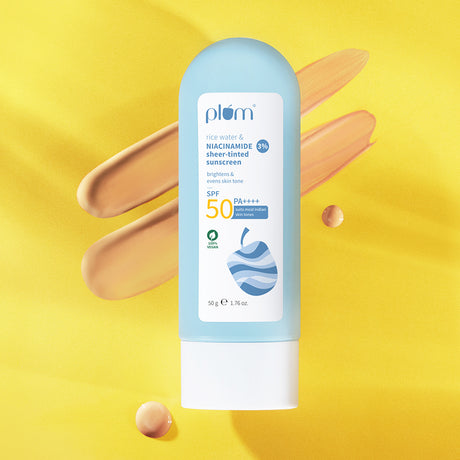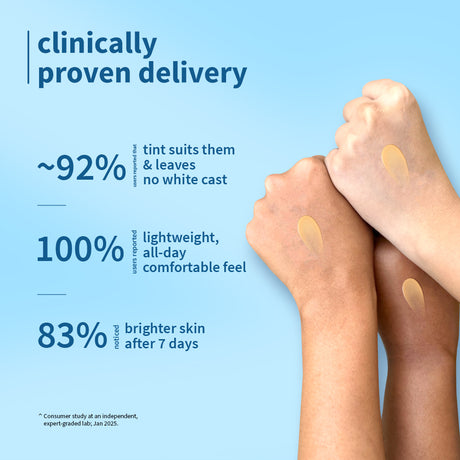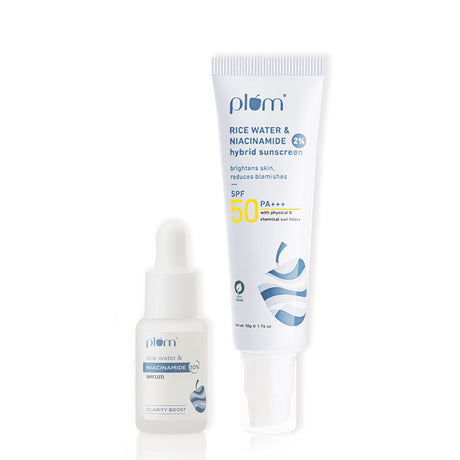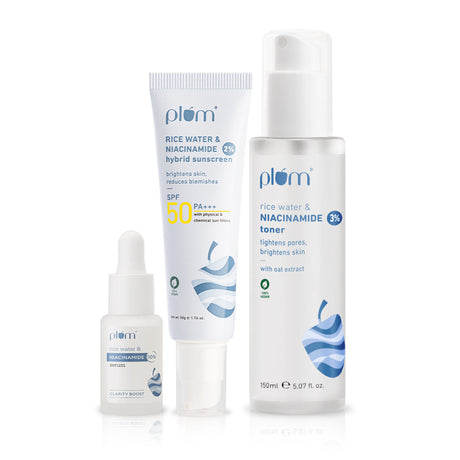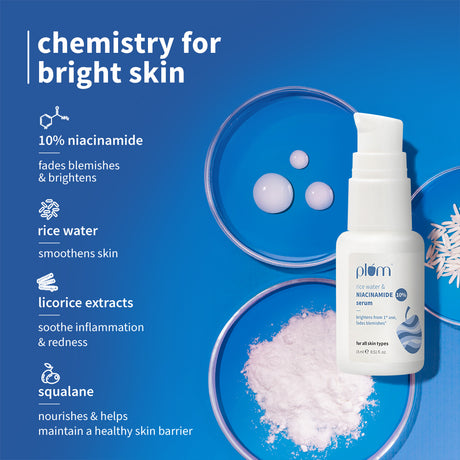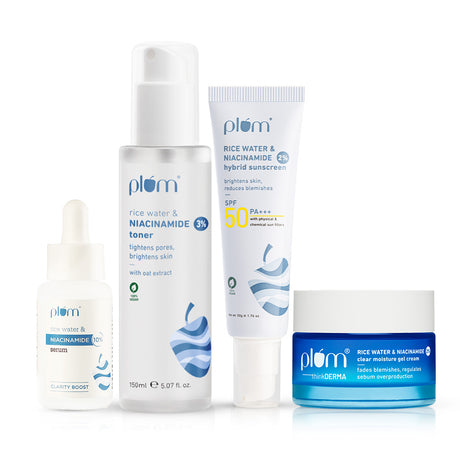-
2% Niacinamide Sunscreen & Rice Water SPF 50 PA++++ Sunscreen
In-vivo & in-vitro tested | non-comedogenic | 4-hr water resistant
all skin types₹319.00₹399.00(20% off)Unit price /Unavailable -
3% Niacinamide & Rice Water SPF 50 Sheer-Tinted Sunscreen
Universal Tint for Most Indian Skin Tones | Non-Greasy
all skin types20% off₹399.00₹499.00(20% off)Unit price /Unavailable -
Cica & Hyaluronic Acid SPF 50 Sunscreen
Safe, New Gen UV Filters | Non-Sticky| Non-Oily
all skin types20% off 25% off₹319.00₹399.00(20% off)Unit price /Unavailable -
Glow & Protect Duo | 15% Vitamin C Serum 30ml, Cica & Hyaluronic Acid SPF 50 PA+++ Sunscreen 50g
Safe, New-Gen UV Filters | Boosts Glow | Fades Dark Spots
₹951.00₹1,189.00(20% off)Unit price /Unavailable -
Niacinamide Bright Protection duo | 10% Niacinamide & Rice Water Face Serum 15ml, 2% Niacinamide & Rice Water SPF 50 PA+++ Sunscreen 50g new
Broad spectrum UVA/UVB Protection | Brightens | Fades Blemishes | Smoothens Skin Texture
₹561.00₹748.00(25% off)Unit price /Unavailable -
Niacinamide Bright Skin Trio | With Toner, Serum & SPF 50 Sunscreen for Bright Skin new
Fades Blemishes & Smoothens
all skin types₹831.00₹1,188.00(30% off)Unit price /Unavailable -
Niacinamide Clear & Bright Skin Combo | With Niacinamide & Rice Water | Toner, Serum, Gel Moisturizer & SPF 50 PA+++ Sunscreen
Brightens Skin | Fades Blemishes | Smoothens Skin Texture | For All Skin Types
all skin types₹1,314.00₹2,023.00(35% off)Unit price /Unavailable -
Squalane & Vitamin E SPF 50 PA+++ Dewy-Bright Sunscreen
Safe, New Gen UV Filters | No White Cast
all skin types20% off 25% off₹399.00₹499.00(20% off)Unit price /Unavailable
Keeping your skin protected in winter is just as, if not more, important than it is in the sunny summer months. While the foggy cold weather might trick you into thinking your skin is safe, when the sun is not visible, UV rays can still cause damage. You would be surprised to know that the UV rays are reflected off snow or clouds, causing equal damage.
A sunscreen for winter will help prevent such damage while protecting your skin throughout the season.
Why sunscreen is essential in winter
Winter SPF protects against both UVA and UVB rays, preventing premature aging, sunburns, and skin damage caused by UV rays reflected from clouds, fog, and snow. Experts believe that the ozone layer is thinner during winter, leading to easier and faster UV penetration. Therefore, whether you’re spending time outdoors or just running errands, sunscreen for the winter season ensures your skin stays protected.
How to Choose the right SPF for cold weather
Broad-Spectrum: While exploring the best sunscreen for winter, opt for a broad-spectrum with a high SPF rating, of at least 30. The best SPF for winter will safeguard your skin from both UVA (aging) and UVB (burning) rays, ensuring comprehensive coverage.
Texture: A thick sunscreen can clog your pores or irritate your skin. Look for winter SPF cream with a lightweight texture that hydrates the skin without leaving it greasy.
Ingredients
When selecting the best winter sunscreen for the face, look for ingredients that provide hydration with sun protection. You can opt for ingredients like hyaluronic acid, cica, niacinamide, glycerin, and ceramides that help lock in moisture, preventing dry winter skin.
Additionally, zinc oxide and titanium dioxide are effective in providing physical UV protection, making these a must in sunscreen creams for winter. Moreover, antioxidants like vitamin E or green tea extract can offer protection against free radicals, keeping your skin healthy and radiant.
Common winter sunscreen myths debunked
-
It is a myth that sunscreen isn’t necessary in winter.
UV rays can still penetrate through clouds and glass or reflect through fog and snow which is why winter sunscreen is a must.
-
It is a myth that sunscreen should only be applied when outdoors
Sun damage can happen outdoors as well as indoors, especially near windows. Therefore it is crucial to reapply sunscreen, even in winter to ensure consistent protection throughout the day.
Best winter sunscreens from Plum
Explore the best winter sunscreens from Plum that protect while nourishing your skin. These sunscreens are formulated with skin-loving, high-quality ingredients, and are 100% vegan and cruelty-free. Plum’s best winter sunscreen for the face is ideal for all skin types, delivering a nongreasy finish that won’t feel heavy on your skin.
frequently asked questions
Do I need to wear sunscreen in winter?
Yes, UV rays are present year-round and can damage your skin even in colder months. Sunscreen should be worn daily, even in winter.
What Sunscreen SPF is best to wear in winter?
For optimal protection, it’s recommended to use SPF 30 or higher in winter to protect against both UVA and UVB rays.
How often should I reapply sunscreen in winter?
Sunscreen should be reapplied every two hours, especially if you’re spending extended time outdoors or after sweating.
Which sunscreen is best for winter?
The best sunscreen for the winter season is one that provides broad-spectrum protection, hydrates the skin, and has an SPF of 30 or higher.






